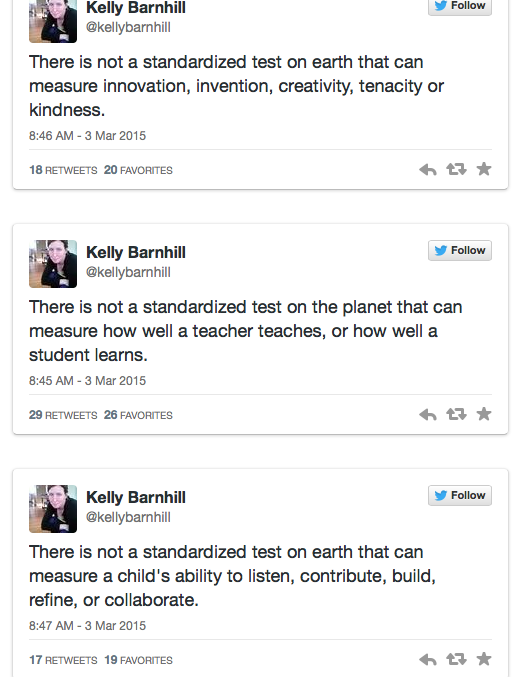
Dear Administrators, Legislators, Pundits, Superintendents, Mayors, Governors, Education Policy Writers, Board Members, General Directors, Committee Members, Department Heads and other members of the Blowharding and Bloviating classes:
Greetings.
I hope this letter finds you well. First of all, let me thank you – truly and sincerely – for your tireless work on behalf of students everywhere. I know that we don’t always come to the same conclusion, but I do appreciate your hard work and your efforts.
I am writing to you today because I have just finished writing another letter to my son’s teacher, opting him out of the upcoming Standardized Tests. I feel – no, I know – that his time will be much better spent doing enrichment work or reading a book. There are other parents at his school who have opted to do the same, and it makes me terribly happy to know that not all of the children will be subjected to the same mindless, soulless, and, frankly, pointless drudgery of yet another standardized test. And for what? What do these tests actually accomplish?
Alas, not much, according to recent research. It is not particular tests that are the problem, Dr. Walter Stroup’s research finds. Alas, the problem rests in the DNA of the test itself. To use a rather silly analogy – we are using a bathroom scale to measure how high a student can jump. The bathroom scale works fine. It’s just the wrong tool for the job.
(The vehemence and nastiness with which Pearson Education has attacked Dr. Stroup only indicates to me that they don’t like seeing their faces in the mirror, and are attacking the person who happens to be holding it. It is a childish move, detailed here.)
I went on a bit of a rant about the subject today.

Actually, it went on from there:
 Which leads me to my proposal:
Which leads me to my proposal:
In this country, we spend 1.7 billion (or we did in 2012. It is higher now.) (and that number is just what we pay to the companies – it does not count the labor hours we spend to get the kids ready to take those tests, or the labor hours needed to re-test the kids who fail) on tests that do not give an accurate or clear or even coherent view into the landscape of a student’s learning. The only thing a test demonstrates is a student’s ability to take a test. That is it. Which means that we are spending a heck of a lot of money getting information on our kids that is, ultimately, useless. How often do you use your ability to do well on a test? Personally, I never do. So why are we doing it.
Now, I know that representatives from these companies have done an excellent job convincing you of their worth. And these representatives are well-spoken and well-dressed and well-heeled. They have shiny shoes and pressed suits and statement necklaces and polished teeth. Wide chins. A sharky look about the eye. I have met these people too. I have also smiled and nodded. I know that when they explain why their 35 million dollar test was riddled with errors, it sounded vaguely reasonable, and you left the room thinking that the teachers were somehow responsible or complicit.
I get it. These people are good at what they do. They just are wrong.
The best assessment tool for a child’s learning is from one source: the child’s teacher. They are the professionals. They are the experts.
So. Given that landscape, why don’t we try a different approach. We don’t have to do it forever – I’d never suggest something so hasty! Instead, we can try an experiment: let us, for a period of one year, refrain from testing. Just one year. All across the country. And let’s investigate what else we could do with that extra time and extra money.
And then let’s see, after the one year period expires, if the current testing regime continues to make sense.
Imagine what we could do with 1.7 billion extra dollars for that one year. Imagine what the kids could learn with that extra time.
We could buy 1.7 billion dollars worth of books.
We could increase spending on school nutrition programs.
We could hire more teachers and de-crowd the classrooms.
We could hire some librarians.
Hell, we could build some libraries.
We could take the kids out on a field trip to a museum or a nature area.
We could hire more counselors. Or social workers. Or nurses.
We could enrich the classrooms.
We could take the month that it takes for test prep and do a unit on Pablo Neruda. Or string theory. Or computer programming. Or robotics.
Just one year. Then we can go back to overspending on tests and getting nothing in return. But oh! Just think of what it would mean to our kids to have one year to just focus on their learning! Just think of what it would be like for the teachers to have the freedom and professional responsibility to actually teach! Just think of what we could do with that year and with that money. It warms the heart to think about it.
And that is what I am asking, ladies and gentlemen. I am asking you to think about it.
Yours in Solidarity and Learning,
Kelly Barnhill.

Reblogged this on American Soustannie and commented:
I had no idea these stupid, stupid … argh, no other word for it, STUPID tests were optional. Maybe they aren’t in all states – but they should be! And parents should be told that they’re optional! If the majority of parents simply withdrew their children from participation in this STUPID test mania, maybe teachers could get back to teaching, and schools could go back to being places of learning.
I have never met a single person – teacher, parent or concerned member of the community – who believes these tests add any value at all. But I’m sharing this post written by a parent and former teacher because I really want to spread the word that these tests are OPTIONAL. So please, if you have kids at school, OPT OUT!
AMEN!! As a mom and middle school teacher of English Learners — who probably spend more time testing than any other children, despite the fact that they might also be the ones who most suffer from all that lost instructional time — thank you. You get it. I’m sharing this blog.
Reporting in from the UK, where I moved after an up-to-then lifetime in the US: They’re using standardized tests here too, and they’re just as pointless and just as soul-sucking. When a young friend of mine was studying for the high-stakes GCSEs (never mind what it stands for–your grades determine your chances of getting into a university), his English class wasn’t even reading the whole of a Dickens novel, just a few chapters that they analyzed to pieces in order to write about them on the test. He’ll hate Dickens for the rest of his life–and who wouldn’t? What a loss. Standardized testing has become a religion–and a very profitable one if you’re on the right side of it.
Great post.
Well said Kelly! We have something that sounds similar here in Australia and it causes more strife than not.
Oh Kelly, what a magical year of learning that would be!! And just think of the ling term ramifications of spending thise dollars on food, libraries, field trips …. !
sigh
Brain tumor = typos I can’t see as I write, only once I read, sorry!